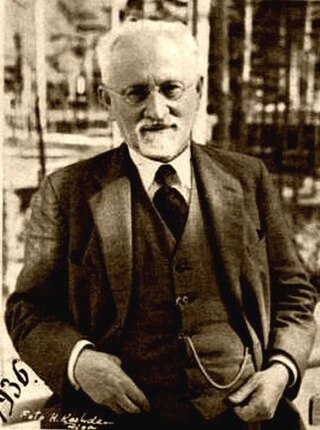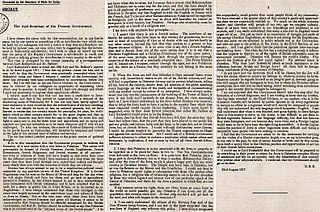
Zionism is a nationalist movement that emerged in Europe in the late 19th century aiming for the establishment of a homeland for the Jewish people, particularly in Palestine, a region roughly corresponding to the Land of Israel in Jewish tradition. Following the establishment of the State of Israel, Zionism became an ideology that supports the development and protection of Israel as a Jewish state. It has also been described as Israel's national or state ideology.

Asher Zvi Hirsch Ginsberg, primarily known by his Hebrew name and pen name Ahad Ha'am, was a Hebrew journalist and essayist, and one of the foremost pre-state Zionist thinkers. He is known as the founder of cultural Zionism. With his vision of a Jewish "spiritual center" in Eretz Israel, his views regarding the purpose of a Jewish state contrasted with those of prominent figures within the Zionist movement such as Theodor Herzl, the founder of political Zionism. Unlike Herzl, Ahad Ha'am strived for "a Jewish state and not merely a state of Jews".

Simon Dubnow was a Jewish-Russian historian, writer and activist.
Autonomism is a set of left-wing, socialist movements that first appeared in Italy in the 1970s.
The Folkspartei was founded after the 1905 pogroms in the Russian Empire by Simon Dubnow and Israel Efrojkin. The party took part in several elections in Poland and Lithuania in the 1920s and 1930s and did not survive the Holocaust.

Cultural Zionism is a strain of Zionism that focused on creating a center in historic Palestine with its own secular Jewish culture and national history, including language and historical roots, rather than other Zionist ideas such as Political Zionism. The founder of Cultural Zionism is Asher Ginsberg, better known as Ahad Ha'am. With his secular vision of a Jewish "spiritual center" in Israel, he confronted Theodor Herzl. Unlike Herzl, the founder of political Zionism, Ha'am strived for "a Jewish state and not merely a state of Jews".
The rise of the Western notion of nationalism in the Ottoman Empire eventually caused the breakdown of the Ottoman millet system. The concept of nationhood, which was different from the preceding religious community concept of the millet system, was a key factor in the decline of the Ottoman Empire.
Hans Kohn was an American philosopher and historian. He pioneered the academic study of nationalism, and is considered an authority on the subject.
Non-Zionism is the political stance of Jews who are "willing to help support Jewish settlement in Palestine ... but will not come on aliyah."
The negation of the Diaspora is a central assumption in many currents of Zionism. The concept encourages the dedication to Zionism and it is used to justify the denial of the feasibility of Jewish emancipation in the Diaspora, arguing that Diasporic life leads either to discrimination and persecution or Jewish national decadence and assimilation. A more moderate formulation says that the Jews as a people have no future without a "spiritual center" in the Land of Israel.

United Jewish Socialist Workers Party was a political party that emerged in Russia in the wake of the 1917 February Revolution. Members of the party along with the Poalei Zion participated in the government of Ukraine and condemned the October Revolution.

Anti-Zionism is opposition to Zionism. Although anti-Zionism is a heterogeneous phenomenon, all its proponents agree that the creation of the modern State of Israel, and the movement to create a sovereign Jewish state in the region of Palestine—a region partly coinciding with the biblical Land of Israel—was flawed or unjust in some way.
Folksgrupe was a Jewish Anti-Zionist political organization in Russia, founded at a meeting in Vilna in March 1905. The organization proclaimed to work for establishing 'civil, political and national rights for the Jewish People in Russia'. The full name of the organization was the League for the Attainment of Full Rights for the Jewish People in Russia. Its followers were known as Dostizhentsi.

The common definition of Zionism was principally the endorsement of the Jewish people to return to their homeland, secondarily the claim that due to a lack of self-determination, this territory must be re-established as a Jewish state. Zionism was produced by various philosophers representing different approaches concerning the objective and path that Zionism should follow.
Wir Juden is a 1934 book by German rabbi Joachim Prinz that concerns Hitler's rise to power as a demonstration of the defeat of liberalism and assimilation as a solution for the "Jewish Question", and advocated a Zionist alternative to save German Jews. The book urged German Jews to escape National Socialist persecution by emigrating to Palestine. Prinz himself was expelled in 1937, travelling to the US where he became a leader of the American Jewish community and the Civil Rights Movement.
Ihud was a small binationalist Zionist political party founded by Judah Leon Magnes, Martin Buber, Ernst Simon and Henrietta Szold, former supporters of Brit Shalom, in 1942 as a binational response to the Biltmore Conference, which made the establishment of a Jewish Commonwealth in Palestine the policy of the Zionist movement. Other prominent members were David Werner Senator, Moshe Smilansky, agronomist Haim Margaliot-Kalvarisky (1868–1947), and Judge Joseph Moshe Valero.
This timeline of anti-Zionism chronicles the history of anti-Zionism, including events in the history of anti-Zionist thought.
Labor Zionism or socialist Zionism refers to the left-wing, socialist variation of Zionism. For many years, it was the most significant tendency among Zionists and Zionist organizations, and was seen as the Zionist sector of the historic Jewish labour movements of Eastern Europe and Central Europe, eventually developing local units in most countries with sizable Jewish populations. Unlike the "political Zionist" tendency founded by Theodor Herzl and advocated by Chaim Weizmann, Labor Zionists did not believe that a Jewish state would be created by simply appealing to the international community or to powerful nations such as the United Kingdom, Germany, or the former Ottoman Empire. Rather, they believed that a Jewish state could only be created through the efforts of the Jewish working class making aliyah to the Land of Israel and raising a country through the creation of a Labor Jewish society with rural kibbutzim and moshavim, and an urban Jewish Proletariat.
Golus nationalism, or Diaspora Nationalism, is a national movement of the Jewish people that argues for furthering Jewish national and cultural life in the large Jewish centers throughout the world, while at the same time seeking recognition for a Jewish national identity from world powers. The term golus has been understood both to mean diaspora, as well as exile.








